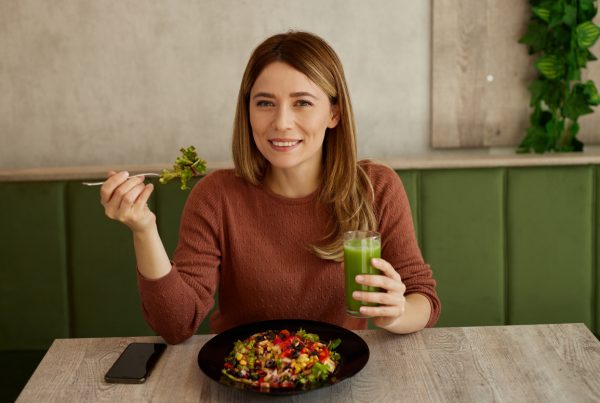Dr Linia Patel (PhD), RD delivers part one in a two-part series covering the smart guide to supplements and asks, is a balanced diet enough?
Being a performance nutritionist and a women’s health dietitian for almost 20 years, I’ve spent countless hours in face-to-face consultations discussing supplements – what works, what doesn’t and what’s simply marketing fluff. I’ve seen the industry evolve, with some products backed by solid science while others remain nothing more than expensive placebos.
There have been moments in my career when the frustration of poor-quality supplements led me to consider launching my own line of food-state supplements. Life, however, had its own plans. Instead, I recently joined Indi supplements as Head of Nutrition, a decision aligned with my commitment to evidence-based, high-quality supplementation. That said, this article is written from my perspective as an independent practitioner.
What to expect in this guide:
Part 1: Is a Balanced Diet Enough?
- The current nutritional gaps most people face
- Key questions to ask yourself before taking a supplement
Part 2: Your Supplement Masterclass
- The daily essentials: multivitamins, omega-3, vitamin D, vitamin C, B vitamins, magnesium, collagen
- Supplements to cycle in and out: probiotics, adaptogens and brain health supplements
Whether you’re a fit pro with nutrition interests wanting to advise your clients or simply someone looking to optimise your own health, this guide will help you navigate supplementation with clarity and confidence.
Is a balanced diet enough?
The ideal world1,2,3
As a dietitian, my philosophy has always been food first. We don’t eat isolated nutrients – we eat whole foods, where vitamins and minerals exist in their natural food state, bound to a host of compounds that enhance their absorption and assimilation and all of which work synergistically to support optimal health.
That said, the reality of 21st-century living makes it increasingly difficult to get all the nutrients we need from food alone. For one, achieving a perfectly balanced diet is incredibly challenging – even as a dietitian who eats well, I certainly don’t eat ‘perfectly’ (and, frankly, perfection in nutrition isn’t sustainable). On top of that, our fast-paced, high-stress lifestyles often fuelled by caffeine drive up the demand for certain nutrients. Chronic stress, for example, rapidly depletes B vitamins and magnesium, increasing our need for these essential micronutrients.
To make matters worse, the food we eat today isn’t as nutrient-dense as it once was. Decades of modern agricultural practices – intensive farming, monocropping, synthetic fertilizers and soil depletion – have stripped our soil of essential minerals, meaning that even fresh, whole foods may not provide the same level of nutrients as they did for previous generations. All of this to say: nutrient gaps are real and they’re becoming more common.
The nutritional gaps4,5
One of the biggest nutritional gaps today is fibre deficiency. According to the latest national survey, a staggering 95% of us don’t get enough fibre. Yet, adding just 5g of fibre per day can reduce your risk of dying from chronic disease by 14-15% – and the more fibre you consume, the greater your chances of living a longer, healthier life. In fact, increasing fibre intake may be one of the most impactful dietary changes you can make for overall health.
The same UK National Nutrition and Health Survey highlights other widespread nutrient shortfalls:
- Vitamin D: Around 50% of UK adults have suboptimal levels and one in six are deficient, putting them at risk for rickets, bone pain and other health issues.
- Iron: Over 25% of women have iron intakes below the lower recommended nutrient intake, increasing the risk of fatigue and anaemia.
- Magnesium: More than one in 10 adults fail to meet the lower recommended intake, which can impact muscle function, sleep and stress management.
- Potassium: A quarter of women and 10% of men fall short, affecting blood pressure regulation and overall heart health.
Now, the solution to these nutrient gaps is not to rely on supplements alone – it’s always food first. But not always food only. A nutrient-rich, well-balanced diet should be the foundation of good health. However, there are times when supplements, taken in meaningful doses at the right time, can play a valuable role.
That said, good-quality supplements cost money and it’s easy to find yourself spending a small fortune each month. That’s why I’m all about taking only what you truly need – in the right forms, at the right doses – to make a difference
Ask yourself these questions if you are considering taking a supplement6
You are unique, and so are your nutritional needs. Many factors influence how your body absorbs and utilises nutrients – your sex (especially if you’re female, where life stage and menstrual cycle play a role), your age, your body composition, any health conditions or medications you take, and your lifestyle choices.
Before reaching for a supplement, it’s worth asking yourself these key questions:
- Are you missing out on certain food groups?
- This could be due to a medical condition, a restricted diet or a low appetite (if you are on a GLP antagonist, as an example). If the answer is yes, what food groups or foods are you avoiding and what nutrients might you be missing?
- Do you have an increased need for nutrients?
- Factors like illness, injury, recovery from surgery, pregnancy, breastfeeding or intense physical training all raise nutrient demands.
- Lifestyle habits matter too – do you smoke, drink alcohol or coffee in excess, or live under chronic stress? These can all deplete key nutrients.
- Are you losing more nutrients than usual?
- Conditions such as chronic diarrhoea, heavy periods, excessive sweating or living with a long-term medical condition impact nutrient loss.
- Are you taking any medications?
- Some medications interfere with nutrient absorption or metabolism. Ask your doctor if there are any potential nutrient interactions with any prescriptions you’re on.
- How do you know if you are deficient?
- What are the most valid and reliable ways to assess a deficiency? Blood tests? Symptom tracking? Simply guessing or using unvalidated tests (i.e. hair analysis) or googling won’t cut it.
- How long will you need this supplement?
- Do you plan to take the supplement for the short-term fix or do you need ongoing support? Your nutritional needs may change over time.
- How much do you actually need?
- More isn’t always better. Dosing matters, and too much of a good thing can sometimes be harmful.
Answering these questions will help you personalise your supplement strategy, ensuring you take only what your body truly needs – at the right time and in the right amount.
Explore Dr Linia Patel’s nutritional advice in her guide to protein powders on the FitPro blog.
References
- British Dietetic Association. Supplement Fact Sheet. Accessed here: https://www.bda.uk.com/resource/supplements.html
- Jacobs R (2009), Food synergy: an operation concept for understanding nutrition, Am J Clin Nutr., 89(5): 1543S-1548S.
- com.Supplements. Accessed here: https://examine.com/search/?q=supplements
- Lockyer et al (2016), Dietary fibre and the prevention of chronic disease – should health professionals be doing more to raise awareness? Nutrition Bulletin.
- Derbyshire (2018), Micronutrient intakes of British adults across mid-life: A secondary analysis of the UK National Diet and Nutrition Survey, Front Nutr., 19(5):55. doi: 3389/fnut.2018.00055
- Wierzejska et al (2021), Dietary supplements – for whom? The current state of knowledge about the health effects of selected supplement use, Int J Environ Res Public Health, 18(17): 8,897.








